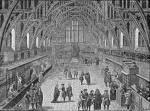One of the World's Leading
Sources of Information On Books, Literature, and a Wide Range of
Subjects
Westminster Hall
(Note: This is taken from W. Roberts' The Book-Hunter in London.)

There is not, perhaps, in the whole world, a more interesting bookselling locality than Westminster Hall. This place is redolent with historical associations, with parliaments, coronations, revelries, and impeachments. Stalls for books, as well as other small merchandise, were permitted in the hall of the palace of Westminster early in the sixteenth century. The poor scholars of Westminster also were employed in hawking books between school-hours. In the procession of sanctuary men who accompanied the Abbot of Westminster and his convent, December 6, 1556, was 'a boy that killed a big boy that sold papers and printed books, with hurling of a stone, and hit him under the ear in Westminster Hall.' In the churchwardens' accounts of the parish of St. Margaret, Westminster, there is, under date 1498-1500, an entry: 'Item, Received for another legende solde in Westmynster halle, vs. viijd.,' the 'legende' being one of the thirteen copies of 'The Golden Legend' bequeathed by Caxton to the 'behove' of the parish of St. Margaret's. Towards the end of the sixteenth century Tom Nash wrote: 'Looke to it, you booksellers and stationers, and let not your shop be infested with any such goose gyblets, or stinking garbadge as the jygs of newsmongers; and especially such of you as frequent Westminster Hall, let them be circumspect what dunghill papers they bring thether: for one bad pamphlet is inough to raise a dampe that may poyson a whole towne,' etc. At first the shops or stalls were ranged along the blank wall on the southern side of the hall. Subsequently they occupied not only the whole of the side, but such portion of the other as was not occupied by the Court of Common Pleas, which then sat within the hall itself, as did the Chancery and King's Bench at its farther end. Gravelot's print of the hall during term-time shows this arrangement. The stationers and other tradespeople in the hall were a privileged class, inasmuch as they were exempt from the pains and penalties relative to the license and regulation of the press. Here as elsewhere there were plenty of inferior books obtainable; Pepys, writing October 26, 1660, and referring to some purchases made in the hall, remarks: 'Among other books, one of the life of our Queen, which I read at home to my wife, but it was so sillily writ that we did nothing but laugh over it.' The stalls were distinguished by signs. One of the early issues of 'Paradise Lost,' 1668, contains the name, among others, of Henry Mortlock, of the White Hart, Westminster Hall, but whose shop was at the Phœnix, St. Paul's Churchyard; Raleigh's 'Remains,' 1675, was printed for Mortlock. The majority of the hall booksellers had regular shops in St. Paul's Churchyard or elsewhere, for it is scarcely likely that they would open these stalls during vacation. Matthew Gilliflower, of the Spread Eagle and Crown, was one of the most enterprising of his class during the last quarter of the seventeenth century. James Collins, of the King's Head, was here contemporaneously with Gilliflower. C. King and Stagg were also extensive partners in 'adventures' in new books, and were among the 'unprejudiced booksellers' who acted as agents for the Gentleman's Magazine during the first year of its existence. At about the same time also, B. Toovey and J. Renn, were selling books here. Early in the reign of George III. the traders were ousted from Westminster Hall; and in 1834 the dirty and mutilated vast parallelogram was thoroughly cleaned and repaired. Westminster Hall as a bookselling centre bears the same affinity to the trade proper as the sweetmeat stalls at a fair bear to confectionery. The books exposed for sale would only by a rare chance be choice or notable, and it was certainly not a likely place for folios or quartos.
Home | Book Collecting | Folklore / Myth | Philately | Playing Cards | Literature | Contents
